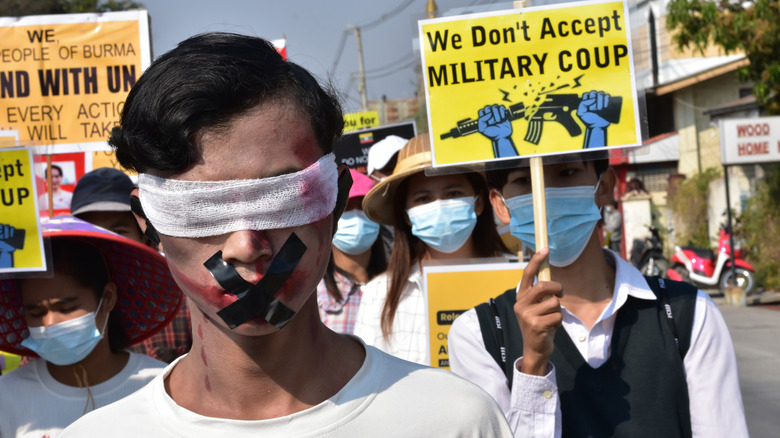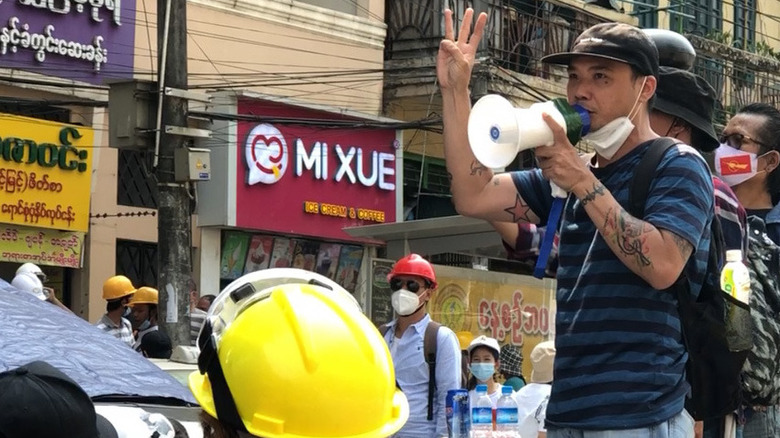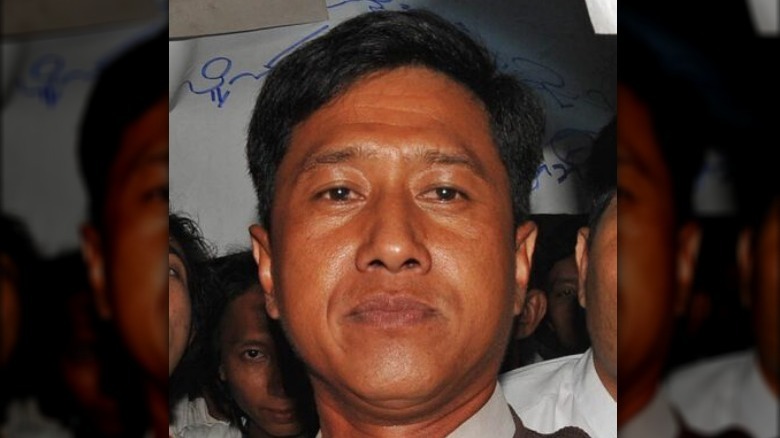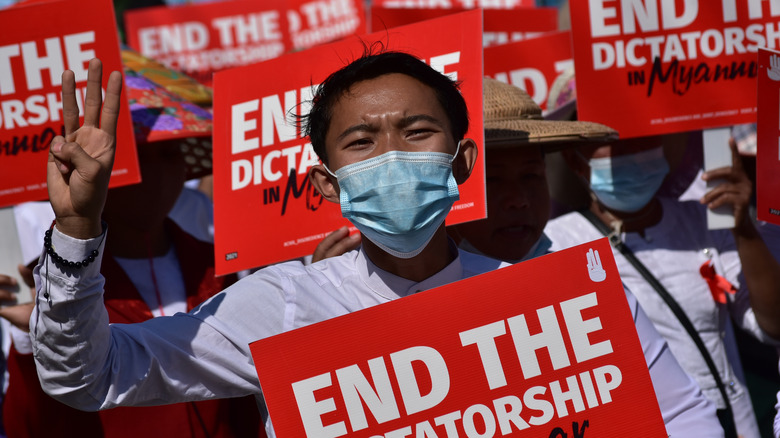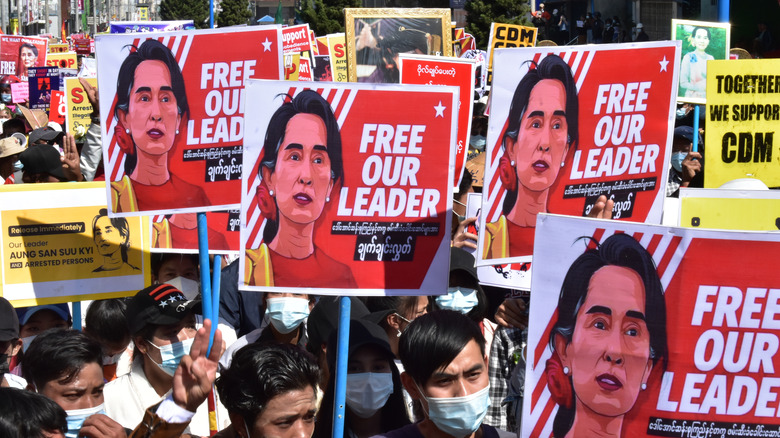What Do We Know About The Four Men Executed By Myanmar's Junta
On July 25, 2022, state news outlet Global New Light of Myanmar reported that four individuals had been executed in Myanmar for alleged terrorist actions. Since February 1, 2021, Myanmar has been under military control after a coup — aka "junta" — overthrew democratically elected leader and Nobel laureate Aung San Suu Kyi, as CNN reports. Suu Kyi has remained under house arrest ever since, while the rest of her country has been thrown into turmoil. Activists speaking out against the illegitimate government have been branded "terrorists," while the Assistance Association for Political Prisoners (AAPP) estimates that the now-military-led government has arrested 14,847 people since the start of the coup, and murdered 2114 more, via the BBC.
Two of the four individuals who were executed were prominent figures under the former Suu Kyi-led government: lawmaker Phyo Zayar Thaw and veteran of the nation's pro-democracy movement since the 1980s, Kyaw Min Yu, also called "Ko Jimmy." Less is known about the other two individuals, Hla Myo Aung and Aung Thura Zaw, aside from them having been arrested for the murder of a junta informant.
Numerous human rights groups around the world have condemned the executions, and also warned about the likelihood of increased oppression under the country's military rule. UN Special Rapporteur Tom Andrews wrote in a statement posted on Twitter, "These individuals were tried, convicted, and sentenced by a military tribunal without the right of appeal and reportedly without legal counsel, in violation of international human rights law."
Hip-hop artist turned politician
Phyo Zayar Thaw was 41 at the time of his execution. As the BBC explains, his path to politics started back in 2000, when he co-founded one of Myanmar's first-ever hip-hop groups, ACID. Their debut album "SaTin Gyin"— "Beginning" — was full of politically defiant lyrics speaking out against Myanmar's then-dictator, Than Shwe. Shwe ruthlessly ran Myanmar's previous military-led junta from 1992 to 2011, as Britannica explains. Between 2011 and 2021 the nation had a scant 10 years of democratic rule before state counselor Aung San Suu Kyi was overthrown.
Come 2007, following Myanmar's "Saffron Revolution" — a 100,000-person peaceful, Buddhist monk-led political protest march (via the BBC) — Phyo Zayar Thaw started "Generation Wave," a youth-oriented, pro-democracy group that operated through underground messaging, pamphlets, graffiti, and more. Zayar Thaw was arrested in 2008, released three years later, and eventually made his way into politics when he worked for Myanmar's National League for Democracy (NLD) under Aung San Suu Kyi. In November 2021, Zayar Thaw was arrested during a raid on an apartment complex in Myanmar's biggest city, Yangon, and accused of planning terrorist attacks against the military.
Friend and co-founder of Generation Wave, Min Yan Naing, said, "Zeya Thaw loathed military dictatorship and injustice since the beginning," continuing, "They [the junta] want to terrorize and frighten people. But as always, Zeya Thaw didn't give a damn about the death sentence" (per the BBC).
Leader of the 88 Generation
Kyaw Min Yu, known as Ko Jimmy, was 53 at the time of his execution. Ko Jimmy was part of a previous generation of political dissidents during Myanmar's 1988 Uprising, as the BBC describes. In a pattern that keeps repeating, Myanmar at the time was ruled by yet another military dictator, General Ne Win. As Britannica says, Ne Win dominated Myanmar — then called Burma — from 1962 to 1988. When the junta changed hands in 1989, the nation's name changed from Burma to Myanmar, via the BBC.
Back in 1988, hundreds of thousands of people revolted against military rule. Ko Jimmy, a student protest leader, was thrown in prison and remained there until 2004. Six years later, fellow protestor Nilar Thein was sent to the same prison as him. Ko Jimmy remembered her from high school, and their romance blossomed behind bars. They were both released the same year, got married, had a daughter, and a mere three years later got caught up in the aforementioned 2007 Saffron Revolution. At the time, the couple was arrested yet again, and released in 2012 to rejoin their daughter. In October 2021, Ko Jimmy was arrested one last time under charges that he'd planned attacks on military targets and state-owned buildings.
"Over the three decades of revolution," Min Zeya said, fellow '88 dissident, "Jimmy has experienced the worst situations both in and out of prisons. We all have to overcome those situations with undaunted spirit."
Families kept in the dark
Little is known about the final two individuals executed during Myanmar's most recent military coup, Hla Myo Aung and Aung Thura Zaw. We only know that the two men were activists in the same vein as Phyo Zayar Thaw and Ko Jimmy, but less high-profile. They'd been sentenced to death on an unspecified date for killing an informant for the current military-led government, as the BBC says. Phyo Zayar Thaw and Ko Jimmy had been sentenced to death on January 21, 2022, under Myanmar's Counterterrorism Law and the Public Property Protection Act, as the United Nations says. All four men appealed their sentences and were denied.
These latest official executions are Myanmar's first known since 1988, and many are concerned that they herald future brutality to come. International humans right organization Amnesty International stated on Twitter, "The death sentence has become one of many appalling ways the Myanmar military is attempting to sow fear among anyone who opposes its rule and would add to the grave human rights violations, including lethal violence targeted at peaceful protesters and other civilians."
In an especially grotesque move, none of the families of those executed were informed of the military-led government's decision; they learned about it through the news like everyone else. Additionally, as the BBC reports, Ko Jimmy's sister stated that no family had received the bodies of their dead. At present, the victims' families have all petitioned the government for more information about the executions.
An endless cycle of coups and dissent
Given the absurdly tragic and cyclic nature of Myanmar's strife — going from dictator to dictator in a still-unresolved revolution — it bears discussing exactly how we got to the present. In a shadow of similar accusations that ought to sound familiar to any American who lived through the 2020 Trump-Biden election, Myanmar's dictatorship began with accusations of a rigged election. After legitimate elected leader Aung San Suu Kyi and her party, the National League for Democracy (NLD), won the nation's last election by a landslide, and with no indications of fraud, General Min Aung Hlaing took it on himself to overthrow the government and put Suu Kyi under house arrest (via the BBC).
In a speech given on March 27, 2021 — less than two months after the coup and amidst citizen uprisings — Min Aung Hlaing said that he would, "no longer take into account negotiation with the terrorist group and their supporters for killing innocent people ... and will annihilate them into an end" (via CNN). Meanwhile, in another CNN article, Human Rights Watch stated that "The junta's barbarity and callous disregard for human life aims to chill the anti-coup protest movement."
The United Nations reports that of the thousands arrested since the military coup last year in 2021, 117 have been sentenced to death, including two children and 41 in absentia. Of civilian deaths attributed to the military, 30% have been caused by the mistreatment of those in custody.
